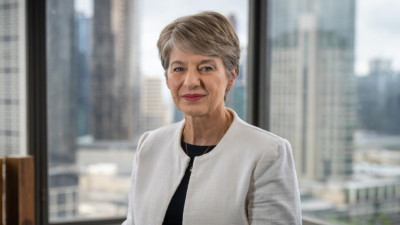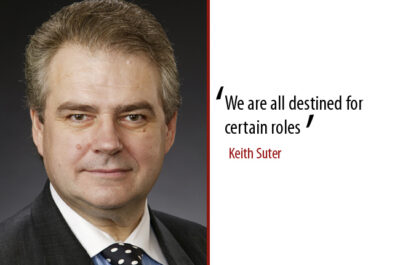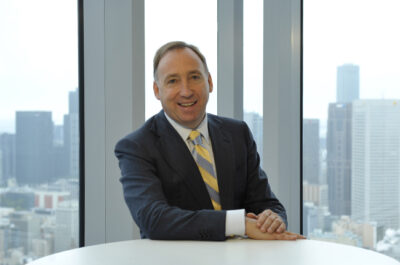Engaged members come with the territory at legalsuper
Andrew Proebstl… ‘I think there’s too much negativity surrounding SMSFs.’
If there’s one super fund that knows a thing or two about mergers, it’s legalsuper, a product of seven mergers inside as many years over the last decade. The chief executive, Andrew Proebstl, has been involved in all of them. He spoke with Greg Bright about the future landscape for smaller industry funds.
Every time legalsuper, now by far the largest super fund for the legal profession, looks at a merger it asks itself what its existing members would gain and lose. It is no coincidence, then, that all of the mergers legalsuper has completed to date have been within the legal profession.
“To date the Board has formed a view that if we were to merge outside our profession,” according to Andrew Proebstl, the chief executive, “our members’ interests would be eroded. But, having said that, the Board is keeping an open mind.”
legalsuper is an interesting fund in many respects. Its members include barristers and lawyers with high account balances and also the management and staff of legal sector businesses. More than 50 per cent of its assets are outside the default investment option, invested across 12 other member-directed investment options. The fund breaks most of the norms in all the surveys for member engagement.
The big challenge for legalsuper, then, is to hold onto a demanding membership base. And it has to do this with a funds-under-management base which some analysts would consider too small, at about $2.2 billion and 40,000 members. The last merger for legalsuper was in 2009 and there are no discrete multi-employer legal funds left.
Proebstl started his career in super almost straight from University. After obtaining an accounting degree in 1987, he did his professional year at the former Arthur Andersen, working primarily in the audit practice. This gave him an important grounding in discipline and analytical skills, he says. “It also taught you how to tell whether people were telling you rubbish or not. I worked with the likes of David Coogan and Tony Cavanagh, who were great teachers. The firm had a lot of industry, corporate and public sector super fund clients.”
Arthur Andersen started a specialist audit group for super funds and ARF (Australian Retirement Fund), was one of Proebstl’s many super fund clients. Others, too, were administration clients of the former Jacques Martin Industry, now SuperPartners, which made Proebstl an offer and led to his move into account management, managing the interface between Jacques Martin Industry and some of its largest clients. It was also his first taste of the business of super.
He was account manager for STA (ARF’s first merger partner, which resulted in what is today Australia’s largest super fund – AustralianSuper) and HostPlus, which older industry folk will remember went through a troubled time in the early 1990s and had its board replaced by the regulator. During this period, Proebstl became the acting fund secretary, for a time.
After a few other short-lived roles, including managing unit pricing at Vanguard and rejoining Arthur Andersen just prior to its implosion off the back of the Enron scandal in the US, he became Chief Executive at LISS (the Legal Industry Superannuation Scheme) in 2003, which was the predecessor of legalsuper. And his career settled down to a more even pace, except, of course, for all those mergers. He was appointed Chief Executive of legalsuper in 2006 after a year of sharing the role with the CEO of the NSW industry fund for the legal profession following the merger of the Victorian (LISS) and NSW legal industry funds.
When he was appointed Chief Executive, the board, led by current chairman David Miles, decided that Proebstl should have a business coach for a year or so. It was, Proebstl says, one of the best things that anyone has ever done for his career.
“It was like fast-forwarding all of the skills I needed, and leveraging off the things I’d already learned. I still stay in touch with my coach. I think having an accounting platform to build on is important, and many boards do have people with accounting backgrounds. I’m respectful of what the accounting discipline gives you as an executive.”
As the fund has grown, though, and as the super industry landscape has changed, there are many different elements to a Chief Executive’s role. Proebstl says that the “people aspect” is really important, and that is not just with fellow staff members. “Most industry funds are still mostly outsourced with investments, administration and insurance and we have to work with that and work with people who have different employers, which present different challenges. I’m really appreciative of the mentoring I got and I try to offer something similar to those around me if I can.”
He says that, with legalsuper’s mergers, no two were the same: “Some didn’t have internal teams, some had boards that were more actively involved in management and others had boards that were more hands off. There were other cases, such as the Victorian Bar Superannuation Fund with about 700 members and $150 million in assets that wanted a representative on our board. You have to be careful and respectful because a lot of people have an emotional investment in their fund with personal involvement over many years. Our approach varied depending on each fund. But they were all interesting.”
The high level of engagement of legalsuper members has thrown up some interesting stories at legalsuper’s fund administrator, AAS. For instance, Proebstl says, one member had kept detailed notes of the last few conversations he’d had with someone in the contact centre, including the names of who he’d spoken with as well as times.
“When we communicate via email, we provide bite-sized chunks of information because that’s what our members want. They’re busy people. It’s about us knowing our members better. We do a lot of research. Whether it’s by emails or with focus groups we always have a high level of response.”
Cost efficiency is also important. The fund wondered whether it should produce a smart-phone app, as others have done, but decided to do a member survey and discovered a resounding lack of enthusiasm.
Proebstl says being an industry super fund legalsuper is able to tailor its services and products to meet the needs of a specific member base, maximising efficiencies and cost savings.
Most recently the fund secured a three-year insurance premium freeze with its insurer OnePath; made possible by the fund’s lower-risk and white collar target market. The freeze comes when most other super funds are increasing premiums due to price competition, greater capital requirements and late claims reporting.
The fund has 17 people in its management team, most of whom are in field roles, enabling it to be deliver high levels of personal service. It has a strong focus on suburban and rural areas and tries to get as close as possible to its members.
“Superannuation is so much about trust,” Proebstl says. “legalsuper’s culture has to live and breath the building of trust with our members and employers.”
He believes legalsuper is “big enough” to provide competitive products and high level of service to its members and “small enough” to be nimble in how its invests and operates also providing levels of personal service.
He also believes that some funds are getting too worked up about the inroads that SMSFs are making on their memberships.
“I think there’s too much negativity surrounding SMSFs. Provided advisers are giving advice in the best interests of members, in a mature industry people should be able to choose the option which suits them best. The use of SMSFs is prevalent in the legal profession, but they are not necessarily mutually exclusive. For example, we have members with an SMSF who stay with us to invest in our international shares investment option. It’s better to have a relationship with a member than no relationship. The heat needs to be taken out of the SMSF argument.”
On another trend which gets a lot of attention, building internal teams to manage investments in-house, Proebstl says a fund needs to ask itself where it can add, and wants to add, the most value. “We think that the board and investment committee should own the investment strategy and asset allocation decisions and uses external advisers and managers to manage the investments,” he says. His fund has two experienced investment professionals at that level, David St John as chair of the investment committee and Neville Hathaway as a member of the investment committee.
Competition from bank-owned funds is also a challenge but Proebstl says they have always been so. “Funds like ours are well positioned because we are in a niche and have clear objectives. Overall, I have a positive view of the future. As fiduciaries, managing other people’s money, we have to have strong conviction and drive to ensure that over the longer term we can help our members live more comfortably in retirement. That’s what it’s all about.”










